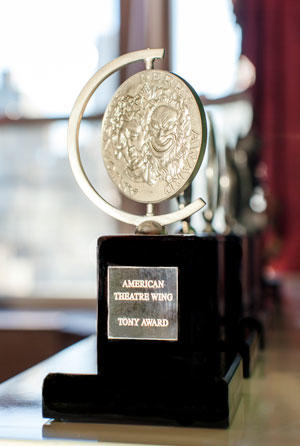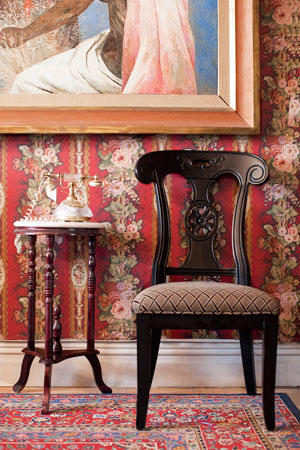Picking a hit show is a gut feeling,” says powerhouse Broadway producer Stewart Lane, standing by a window in his wood-paneled library in his Upper East Side penthouse. “I don’t try and second-guess critics or pander to the public. I just try and find the best way to tell a story.”
Lane, an affable, name-dropping impresario, is an omnivorous collector of stories. His most recent hit, “A Gentleman’s Guide to Love and Murder,” which he produced with his wife Bonnie Comley, won a Tony for Best Musical last year. Lane is also an actor and a writer — his most recent book, “Black Broadway: African Americans on the Great White Way,” was released in February.
Not surprisingly, Lane’s home, which overlooks the copper domes of the St. Jean Baptiste Church on Lexington Avenue and East 76th Street, is chockablock with objects of personal significance, chosen more for their stories than their aesthetics. There are framed signatures (from Irving Berlin, P.T. Barnum and Benjamin Franklin), fine artworks (by Robert Mapplethorpe, Salvador Dali and Victor Vasarely) and old New York memorabilia (like Tiffany-style ceiling fixtures and panels from the old Tavern on the Green).
And then there are his Tonys. For our Luxury Listings NYC photo shoot, Lane gathers his six Tony Awards next to him in the library. (“La Cage aux Folles,” “Thoroughly Modern Millie” and “War Horse” are just a few of his other award-winning successes.) For good measure, Comley — a broadcast journalist turned Broadway producer — adds her three Tonys to the mix. Even for Lane, the sight of nine Tonys gathered together is exciting. He can’t help but smile posed next to them.
But unlike many who have lived with decades of success, Lane isn’t inured to either his fortune or his collection of prestigious accolades. He loves playing the good-humored raconteur, lighting up when he talks about the Tonys. “Growing up in New York, my exposure to Broadway was the Sunday Arts and Leisure section of the New York Times,” Lane says, adding that his parents were of the generation who thought it was a waste of money to take a child to a Broadway show. “Winning a Tony was a dream. So when I was 33 and won my first Tony, I screamed, ‘We did it!’”

Photography by STUDIO SCRIVO
Lane’s enthusiasm and uncanny ability to remember — and give credit to — every writer, performer and stagehand he’s worked with over the years suggests that his passion for Broadway transcends pecuniary success. He gives the impression that had the theater not made him rich, he might have done it all anyway, money be damned.
In fact, Lane says that from age 10, when he saw his first Broadway show, he knew “this was the life me.”
Growing up in Great Neck, Lane, 63, remembers watching the “Twilight Zone” at his friend Ricky’s house, and wondering why Ricky’s dad wasn’t at work. “One day I asked, ‘Ricky, doesn’t your father work?’ And Ricky said, ‘Yeah, my dad is an actor and he works at night.’ I thought, ‘Wow! What a great concept,’ but I never talked to his father, and I had never seen anything his father had done, so I didn’t think much about. That is until Ricky tells me that his father is in a Broadway show.”
Lane had never been to a Broadway performance, and he jumped at Ricky’s invitation to see a musical. “We drove into the city and went inside this beautiful theater — not one of those matchbox movies houses in the suburbs — to see Ricky’s father, Sid Caesar, in ‘Little Me.’”
Of course, Caesar had already been a television star when the 1962 musical was written for him. Neil Simon’s script cast Caesar in multiple roles, including all of the heroine’s husbands and lovers. Lane was entranced. “We went backstage and I saw Sid holding court. It was all friendship and camaraderie. That was it; I was hooked on Broadway.”
That initial childhood thrill matured into an artistic passion. After graduating from Boston University, where he now sits on the boards of trustees and overseers, he hit the stage, earning his place in the actors union performing in a production of “Oklahoma!” at the Little Theater in Sullivan, Illinois.
Since those early days, Lane has worked as an actor, stage manager, writer, director or producer, virtually without pause. And not all of his shows made a splash. In fact, one of his first shows was a monumental failure. “Early on, I produced ‘The Grand Tour’ with music by Jerry Herman and [the actor] Joel Grey. But the show was a flop. It ran three months and didn’t make any money,” Lane recalls. “I was thinking, ‘Oh God! I’ll never work in this town again!’ But I learned very quickly that there is always another show.”
Lane adds that, in a way, that early defeat gave him the connections to produce his first big hit. “Because I worked with Jerry [Herman], I was able to get him back on ‘La Cage aux Folles,’ which turned out to be a big hit,” he says. “There are no failures, just learning experiences.”
Today, those “experiences” have given Lane the comfort to pick and choose the shows he believes in; he is currently working on a new musical, “A Moment in Time,” with music by John Denver. His hits have garnered him the money to maintain his art collections, a stake in the Tribeca Grill with Robert De Niro as well as co-ownership of the sumptuous Palace Theatre on Broadway between 46th and 47th streets.
Some 18 years ago, he was also able to buy his New York City dream home on East 76th Street, where he and Comley have lived ever since. “It’s the only duplex in the building. It has the only fireplace,” Lane says of his apartment, which also boasts a sweeping curved staircase at the entrance, five bedrooms, six full bathrooms and three terraces.
Still, even after nearly two decades in his well-appointed home, a life of luxury feels like a relatively new and welcome development, Lane says, one that he could have managed without. “I’m a diehard New Yorker, so even in the 1970s, which was the grimiest, dirtiest, most graffiti-ridden time in the city, I loved it,” he exclaims. “Things were happening, it was exciting. The city is more boring now, but I’m older now, and a little more boring myself.”
“Do I miss the drug dealers and the hookers? Do I miss the crime? Yeah, there is a certain nostalgia for the three-card Monte hustlers, but not enough to say that I want them back, or that I miss them,” he adds.

Photography by STUDIO SCRIVO
Nonetheless, Lane enjoys looking backward. Whether it’s collecting eclectic bits of history, or producing shows nostalgic for the je ne sais quoi of a bygone age (“A Gentleman’s Guide,” “Thoroughly Modern Millie” and “War Horse”), Lane has made history his ultimate labor of love.
In 2011, Lane published “Jews on Broadway: An Historical Survey of Performers, Playwrights, Composers, Lyricists and Producers.” In it, Lane explores the creative impact of Jewish people on New York theater. And in his latest book, “Black Broadway,” he unburies forgotten black performers and highlights the contributions of legendary African-American stars like James Earl Jones and Josephine Baker.
“It’s my hope that ‘Black Broadway’ serves as a guide to the many people who have blazed a trail to the Great White Way and made it more accessible to everyone — black and white — who seeks to entertain and enlighten us through the performing arts,” Lane writes in the introduction to the colorful and intensely researched book.
As a storyteller and historian of show business, Lane understands better than most that Broadway reflects society, both the good and the bad. In his writing and his shows, he’s not interested in passing holier-than-thou judgments on past mistakes, but rather in telling the tall tales of characters who beat the odds.
“Look at ‘La Cage aux Folles,’ Lane says. “Back in the early 1980s people said I was nuts for producing a gay musical. But just look at it! Yes, it is making a social statement, but it is about loyalty, friendship, love and connection. It’s also very funny and has a great score. That’s what theater is about: bringing people together.”
